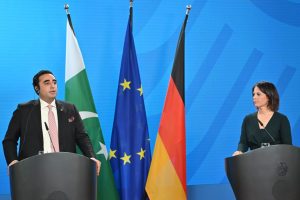Last week, two key developments involving the United States and Germany put Pakistan’s longstanding efforts to highlight the issue of Kashmir internationally relatively on par with India’s attempts to prevent any third-party intervention in the dispute.
U.S. Ambassador to Pakistan Donald Blome and German Foreign Minister Annalena Baerbock separately made statements that appear to endorse Pakistan’s position on Kashmir.
India considers Pakistan-administrated Kashmir as an integral part of India and refers to it as Pakistan-occupied Kashmir. Pakistan, on its part, rejects Indian claims and regards Kashmir as a disputed territory. It wants the dispute to be resolved as per the United Nations resolutions.
During his three-day visit to Pakistan-administrated Kashmir, Blome took many by surprise. A statement from the U.S. Embassy in Pakistan said: “Ambassador Donald Blome visited Azad Jammu and Kashmir (AJK) October 2-4 to promote the U.S.-Pakistan partnership.” It referred to the part of Kashmir under Pakistan’s control as Azad (meaning free) Jammu and Kashmir. The U.S. embassy’s reference to the area using the language Pakistan does is seen in Islamabad as a victory for the Pakistani position.
“While in Muzaffarabad, the Ambassador also visited the Quaid-e-Azam Memorial Dak Bungalow, the Red Fort, and the Jalalabad Garden, symbols of the cultural and historical richness of Pakistan,” the U.S. embassy statement said. For many in Pakistan, designating monuments located in Kashmir as a reflection of Pakistan’s prosperity is yet another sign of U.S. acceptance of Islamabad’s stance on the Kashmir issue.
During his visit, Blome also met with Pakistan army officials deployed in Pakistan-administrated Kashmir to discuss assistance activities to help local communities. It is highly unusual for a U.S. ambassador to visit Pakistan-administered Kashmir and discuss Washington’s investments in the region.
Days after Blome’s visit to Pakistan-administered Kashmir, German Foreign Minister Baerbock said in a joint news conference with her Pakistani counterpart Bilawal Bhutto Zardari that Germany has a “role and responsibility with regard to the situation of Kashmir.” She stressed that her country supports “intensively the engagement of the United Nations to find peaceful resolutions in the region.” Baerbock’s statement reflects extraordinary support for Islamabad’s position on the dispute.
It is unclear if the two developments were coincidental or the outcome of a coordinated push by Pakistan’s backchannel efforts.
In any case, the developments have upset India, which perhaps didn’t expect two of its key Western allies to visibly empower Pakistan’s narrative over the Kashmir dispute.
“Both Blome’s visit and the German foreign minister’s comments have put New Delhi on the defensive. Typically, India has had the upper hand on Kashmir matters because, generally speaking, the international community has tended to side with India and view Kashmir as an issue not to get involved in,” Michael Kugelman, director of the South Asia Institute at the Wilson Center told The Diplomat.
Kugelman says Blome’s visit should be seen as a reflection of a stabilizing U.S.-Pakistan relationship, which was likely driven more by calculations in Washington than anything Foreign Minister Zardari tried to do. “Having America’s top representative in Pakistan make a trip to Pakistan-administered Kashmir to discuss non-security cooperation and people-to-people relations – the aspects of the relationship enjoying the most momentum of late – can therefore be seen as a proposed confidence-building measure,” he said.
“For its entire existence, an important goal of Pakistani diplomacy has been to get the world to take its side on the Kashmir issue. And it’s rarely succeeded on that front,” Kugelman pointed out. “Yet now, a senior Western official [Baerbock] calls on her country to play a role in the Kashmir issue. This is exactly what Pakistan wants, and something that rarely happens,” he said, adding that “this is a diplomatic coup” for Pakistan.
For Islamabad, Blome’s visit and the German foreign minister’s comments indicate that all is not well between India and its Western allies, particularly over the issue of Russia’s invasion of Ukraine. Arguably, Pakistan is making efforts to exploit this opening to put its bilateral ties with the U.S. and European nations back on track.
Moreover, perhaps Islamabad also wants to send a message to India that its efforts to engage third-party intervention over the issue of Kashmir not only remain alive but are also being steadied by New Delhi’s Western allies.
However, it remains unclear what sort of benefits Pakistan can gain from this opening in the long run. Kugelman says it is unlikely that the U.S. and Germany will change their policy on the Kashmir dispute.
“India will double down its Kashmir policy after these developments,” he warns. “I don’t anticipate any new benefits accruing to Kashmiris,” he said.
Earlier this week, Indian Prime Minister Narendra Modi, while addressing a public rally in Gujarat, claimed that he had in some way “resolved the Kashmir issue,” likely a reference to his government’s 2019 move to rescind Jammu and Kashmir’s special status under the Indian Constitution. The remarks drew criticism from Pakistan’s Foreign Office, which in a statement termed Modi’s statement as “false and misleading.”
These actions and statements are an indication that the issue of Kashmir is far from resolved as Pakistan pushes to restore the West’s role in the resolution of the dispute and to gain an upper hand on the matter internationally. But it is unclear if these initiatives can lead to the permanent resolution of the crisis.
For that to happen, both India and Pakistan will have to be willing to show flexibility and realize that the issue remains a major hurdle in the way of a potential bilateral partnership that could change the fate of the entire region.

































